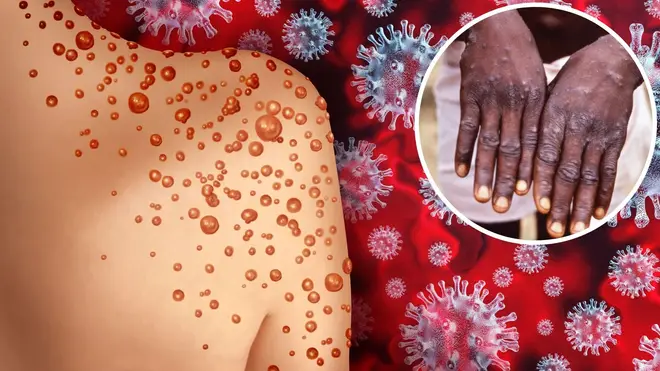
Dean Dunham 9pm - 10pm
23 May 2022, 17:01 | Updated: 23 May 2022, 20:09

The number of confirmed cases of monkeypox in England has risen from 20 to 56.
Scotland has also confirmed its first case today bringing the UK total to 57.
The UK Health Security Agency (UKHSA) said while the current outbreak of monkeypox cases is "significant and concerning", the risk to the population remains low.
READ MORE: High risk contacts of UK monkeypox cases urged to self-isolate for 3 weeks
READ MORE: Monkeypox outbreak linked to superspreader event at adult sauna
Dr Susan Hopkins, chief medical adviser at the UKHSA, said: "Thank you to everyone who has come forward for testing already and supported our contact tracing efforts - you are helping us limit the spread of this infection in the UK.
"Because the virus spreads through close contact, we are urging everyone to be aware of any unusual rashes or lesions, and to contact a sexual health service if they have any symptoms.
"A notable proportion of recent cases in the UK and Europe have been found in gay and bisexual men, so we are particularly encouraging these men to be alert to the symptoms."
Cases of monkeypox have been reported in 14 countries, according to epidemiologists at Harvard University who are tracking the spread, including 40 cases in Spain and 23 in Portugal.
The virus is usually found in West Africa, and does not often spread elsewhere.
It is not normally a sexually-transmitted infection, but can be passed on by direct contact during sex.
It can also be spread through touching clothing, bedding or towels used by someone with the monkeypox rash, and through the coughs and sneezes of somebody with the infection.
#Monkeypox Anyone with unusual rashes or lesions on any part of their body should contact NHS 111 or call a sexual health service. With recent cases mainly reported in gay and bisexual men, those in this community should be particularly alert.
— UK Health Security Agency (@UKHSA) May 23, 2022
Get the latest updates ⏬
The Government has stocks of the smallpox vaccine, which is being offered to very close contacts of those who have been affected.
Those at the highest risk of contracting the disease are being asked to self-isolate at home for 21 days, with others warned to be on the lookout for symptoms.
The disease is usually mild but can cause severe illness in some cases.
Symptoms include fever, headache, muscle aches, backache, swollen lymph nodes, chills and exhaustion.
A rash can develop, often beginning on the face, which then spreads to other parts of the body including the genitals.
Virologist Chris Smith told LBC's Tonight with Andrew Marr the form of monkeypox spreading in the UK is from western Africa and has a mortality rate of one to three per cent.
He said: "Most people will be abolsutely fine if they get this, they may have some blistering but it's not as dramatic as some of the pictures that the media have been displaying.
"We're actually seeing much more trivial skin lesions that could easily be mistaken for just a spot or a pimple."

Monkeypox: Dr Chris Smith speaks to Andrew Marr
Prime Minister Boris Johnson said earlier the virus is rare but it is important to "keep an eye on it".
He told reporters: "It's basically a very rare disease and so far the consequences don't seem to be very serious, but it's important that we keep an eye on it and that's exactly what the the new UK Health Security Agency is doing."
Asked whether there should be quarantine for visitors or the use of the smallpox vaccine, Mr Johnson said: "As things stand the judgment is that it's rare.
"I think we're looking very carefully at the circumstances of transmission. It hasn't yet proved fatal in any case that we know of, certainly not in this country."
The first case identified in the UK was in a person who had returned from Nigeria, but other cases are unrelated to travel.
Downing Street said there are no plans to hold a meeting of the Cobra emergency committee over monkeypox, or to impose any travel bans.
The Prime Minister's official spokesman also said that, while vaccines are being offered to close contacts, there are no plans for an "at scale" vaccination programme.
Anyone with unusual rashes or lesions on any part of their body, especially their genitalia, should contact NHS 111 or call a sexual health service if they have concerns, it said.